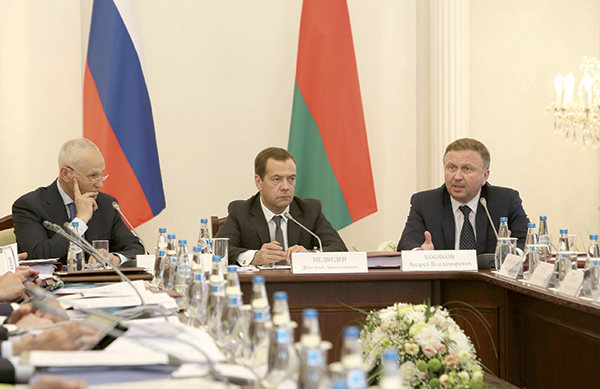The heads of governments of Belarus and Russia, Andrey Kobyakov and Dmitry Medvedev, meet often: five times so far across the first five months of this year. This eloquently confirms the closeness of Belarusian-Russian economic integration. Their sixth meeting, in Mogilev, offers further example. The scheduled meeting of the Union State’s Council of Ministers enjoyed a rich agenda, including 27 major issues for our two states’ social and economic development.

Initially, the heads of governments discussed economic problems and results of cooperation between our two countries, including in the energy sphere. They focused on tariffs for supply of Russian natural gas to Belarus and a major integration project: construction of the first nuclear power station in Belarus, using Russian technologies and loans. Trade and economic relations between Belarus and Russia were discussed and both positive and negative trends noted regarding economic cooperation.
Andrey Kobyakov commented, “Among the most complicated issues is falling commodity turnover in Dollar equivalent, due to the weakening of national currencies. Volumes have hardly changed, even growing since the beginning of this year.”
Figures confirm his words. Russia has strengthened its position as a leading trade partner for Belarus; import volumes to Belarus have increased from 54.8 to 56.6 percent, as a total share. Meanwhile, 48.3 percent of Belarus’ exports go to Russia.
Belarus has strengthened its position among Russia’s five major trade partners, behind China, the Netherlands, Germany and Italy. It is unequalled among the CIS countries. “We’re demonstrating stronger mutual integration interaction,” Mr. Medvedev confirmed.
Mr. Kobyakov named trade statistics for the first quarter of 2016 as confirmation of stabilisation. Mutual commodity turnover in this period increased by over 2.6 percent, with Belarusian exports growing by 4.4 percent and Russian exports to Belarus rising by 1.6 percent. He confirmed specific growth of mutual deliveries of production, showing coordinated development of Union State members.
According to the heads of government, to promote these positive trends, Belarus and Russia need not only to increase the presence of their goods and services on the common market but to sell to third countries. Naturally, international economic sanctions and countersanctions play their part. Happily, despite these circumstances, accompanied by less solvent demand and investment, the Union State countries aren’t being obliged to limit the presence of their closest neighbour on their markets. They haven’t turned to providing state support to their producers or to introducing additional restrictions or informal barriers on exports from the allied country. Mr. Kobyakov stresses, “As members of the Union State Government, we must rise above the selfish interests of certain producers, branch associations and lobbyists of various departments.”
Striking examples of equal and productive cooperation are being observed in the scientific and technical sphere, with most programmes financed from the Union State budget. Four new programmes have been adopted, with one, aimed at car electronics, aiming to promote production of components for passenger cars, raising the technological level of the Union State’s automobile industry. Naturally, we’d like to rival world-known brands, being known for extreme safety, eco-friendliness, comfort, value for money and superb vehicle performance. Mr. Medvedev views this direction as vital for our two states’ economies. “At present, we buy almost all components from abroad but we do have the chance to launch joint production in this sphere,” he said.
This will become an example of effective and co-ordinated import substitution on the basis of domestic hi-tech developments. Union State programme policy for the automobile industry will continue, having saved such leading enterprises as Minsk Automobile Works and Yaroslavl Motor Plant. Such enterprises as Minsk’s Integral JSC will act as a leading company in this sphere; in line with previously adopted Union State programmes, it has mastered batch production of import-substitution special purpose electronic chips. As a result, the company has received orders for many years in advance.
New Union State programmes include support for production of equipment for the space industry, nano-structural optic-electronic devices and development of progressive methods of spinal treatment for children. Three sci-tech programmes have had their concepts approved and, as a result, we have established a reliable reserve of sci-tech cooperation for many years. Most of the Union State budget is being directed in this way, notes the State Secretary of the Union State, Grigory Rapota. He believes that financing will continue, regardless of economic difficulties.
Cooperation in overcoming the consequences of the Chernobyl tragedy is a typical example of the efficient use of the Union State budget. This year marks the 30th anniversary of that fateful event. Mr. Medvedev noted, with regret, “Our countries continue facing the consequences of that catastrophe, jointly working to overcome this sad heritage.”
The Council of Ministers is considering increasing budgetary spending via the fifth Union State programme dealing with mitigation of the consequences of the Chernobyl accident. Common efforts will be concentrated on rendering complex medical care to certain categories of citizens affected by the accident. Three large, specialised medical centres, in Belarus and Russia, have been established as a result of previous Union State programmes, and will undertake all treatments.
The recent sitting was one of the most productive. Held for the first time in Mogilev, situated on the border of Belarus and Russia, its location was symbolic. Cooperation between our regions defines the character and volume of Belarusian-Russian trade and economic relations.
By Vladimir Bibikov











